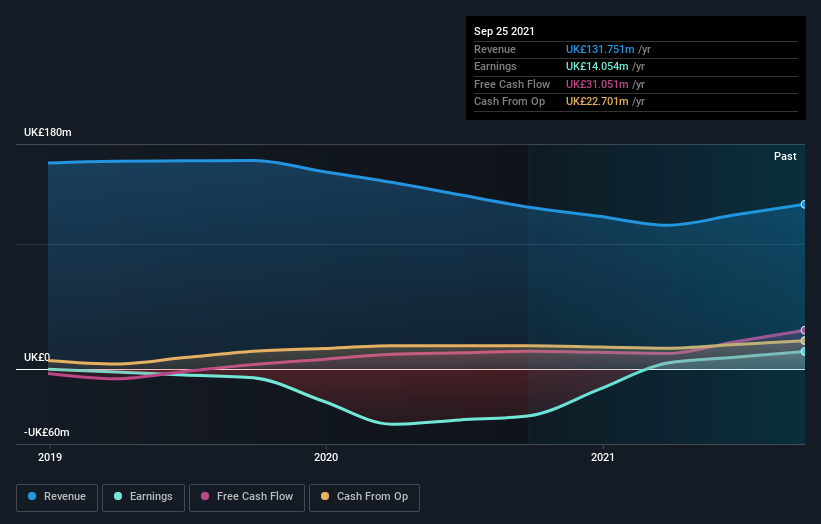- United Kingdom
- /
- Luxury
- /
- AIM:MUL
7.7% earnings growth over 5 years has not materialized into gains for Mulberry Group (LON:MUL) shareholders over that period
Long term investing works well, but it doesn't always work for each individual stock. We don't wish catastrophic capital loss on anyone. Anyone who held Mulberry Group plc (LON:MUL) for five years would be nursing their metaphorical wounds since the share price dropped 76% in that time. And some of the more recent buyers are probably worried, too, with the stock falling 22% in the last year. The falls have accelerated recently, with the share price down 12% in the last three months. However, one could argue that the price has been influenced by the general market, which is down 9.2% in the same timeframe.
If the past week is anything to go by, investor sentiment for Mulberry Group isn't positive, so let's see if there's a mismatch between fundamentals and the share price.
Check out our latest analysis for Mulberry Group
To paraphrase Benjamin Graham: Over the short term the market is a voting machine, but over the long term it's a weighing machine. One flawed but reasonable way to assess how sentiment around a company has changed is to compare the earnings per share (EPS) with the share price.
Mulberry Group became profitable within the last five years. Most would consider that to be a good thing, so it's counter-intuitive to see the share price declining. Other metrics might give us a better handle on how its value is changing over time.
Arguably, the revenue drop of 6.5% a year for half a decade suggests that the company can't grow in the long term. This has probably encouraged some shareholders to sell down the stock.
The company's revenue and earnings (over time) are depicted in the image below (click to see the exact numbers).

Balance sheet strength is crucial. It might be well worthwhile taking a look at our free report on how its financial position has changed over time.
A Different Perspective
While the broader market lost about 3.8% in the twelve months, Mulberry Group shareholders did even worse, losing 22%. Having said that, it's inevitable that some stocks will be oversold in a falling market. The key is to keep your eyes on the fundamental developments. However, the loss over the last year isn't as bad as the 12% per annum loss investors have suffered over the last half decade. We would want clear information suggesting the company will grow, before taking the view that the share price will stabilize. It's always interesting to track share price performance over the longer term. But to understand Mulberry Group better, we need to consider many other factors. Consider risks, for instance. Every company has them, and we've spotted 1 warning sign for Mulberry Group you should know about.
Of course Mulberry Group may not be the best stock to buy. So you may wish to see this free collection of growth stocks.
Please note, the market returns quoted in this article reflect the market weighted average returns of stocks that currently trade on GB exchanges.
New: Manage All Your Stock Portfolios in One Place
We've created the ultimate portfolio companion for stock investors, and it's free.
• Connect an unlimited number of Portfolios and see your total in one currency
• Be alerted to new Warning Signs or Risks via email or mobile
• Track the Fair Value of your stocks
Have feedback on this article? Concerned about the content? Get in touch with us directly. Alternatively, email editorial-team (at) simplywallst.com.
This article by Simply Wall St is general in nature. We provide commentary based on historical data and analyst forecasts only using an unbiased methodology and our articles are not intended to be financial advice. It does not constitute a recommendation to buy or sell any stock, and does not take account of your objectives, or your financial situation. We aim to bring you long-term focused analysis driven by fundamental data. Note that our analysis may not factor in the latest price-sensitive company announcements or qualitative material. Simply Wall St has no position in any stocks mentioned.
About AIM:MUL
Mulberry Group
Designs and manufactures fashion accessories and clothing in the United Kingdom, North America, Asia Pacific, and internationally.
Good value with slight risk.
Market Insights
Community Narratives




